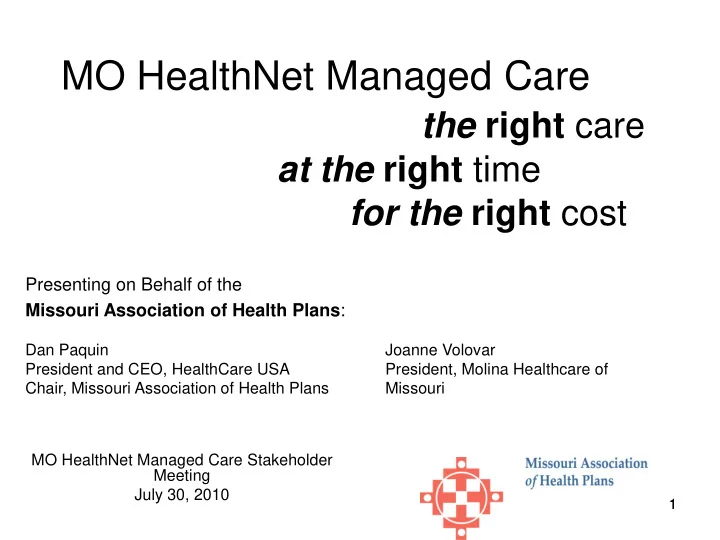

MO HealthNet Managed Care the right care at the right time for the right cost Presenting on Behalf of the Missouri Association of Health Plans : Dan Paquin Joanne Volovar President and CEO, HealthCare USA President, Molina Healthcare of Chair, Missouri Association of Health Plans Missouri MO HealthNet Managed Care Stakeholder Meeting July 30, 2010 1
Missouri Association of Health Plan Members 2
History of Medicaid Managed Care • 1995 - The Missouri General Assembly voted to implement Medicaid Managed Care as a viable, long-term solution to contain cost by ensuring recipients receive the right care , at the right time , at the right cost . • Missouri is one of 48 states across the nation providing Medicaid through Managed Care. • 420,000 Missourians receive their health care through the Medicaid Managed Care Plans. 3
Why Expand Managed Care Now? • State facing unprecedented revenue shortfall of $700 million • High unemployment • Growing number of uninsured • Federal health care reform requirements 4
Value of Medicaid Managed Care • Improve access to care • Improve and assure quality of care • Establish and promote the use of a medical home • Control cost through the payment of capitated rates, giving the state budget predictability 5
Medicaid Health Plans vs. Fee-For-Service Health Plan FFS Benefits to Members l l Identification card proving coverage l A designated primary care physician l Case management of primary care l Disease management l Comprehensive case management Quality standards and continuous quality l improvement programs Cost Containment l Claims analysis l Utilization review Improved generic utilization l Using lower cost services were available l Cost predictability
Medicaid Managed Care Improves Access to Care Access Standards Service Standards • Provider network, distance to get to a doctor • Days to get an appointment • 24 hour telephone availability • All members have a Medical Home Performance Standards • Well-child visits • Care Management of Difficult Pregnancy and Chronic Disease • Health Care Effectiveness Measures (i.e. HEDIS) 7
Medicaid Managed Care Improves and assures quality of care MO HealthNet managed care plans demonstrate improvement on several HEDIS measures 100% 80% 60% 2002 40% 2009 20% 0% Adolescent Asthma Cervical Childhood Chlamydia Annual Well Child Medication Cancer Immunization Screening Dental Visits Visits Use Screening Combined Rate Source: Missouri Department of Health and Human Services 8
Managed Care contains Cost through the following administrative activities: Program Activities Expected Financial Impacts Case Management Coordination of healthcare resources for high utilizing Increases adherence to treatment plans & access to PCP/specialty srvcs; Improves outcomes Members; collaboration with treating physicians; related to chronic illness & high risk OB care; facilitating access to care and preventive care services; Decreases utilization of IP & unnecessary ER srvcs supporting patient empowerment & education Early identification of the at-risk population; Member Improved clinical outcomes specific to the disease Disease Management process as a result of better patient education & and Provider education and tools to support self empowerment (i.e. use of asthma medications; management; Health Coaching to assist members compliance with recommended lab screenings, etc); with lifestyle/behavioral changes; Specific clinical Improved compliance with recommended treatment metrics to measure outcomes of interventions protocols; Decreased IP hospitalizations and unnecessary ER services Member Profiling Risk Profiling (to identify optimal candidates for Early identification of high risk members for education, outreach and care case management and disease management coordination, resulting in decreased programs) utilization of healthcare resources and improved member outcomes Provider Profiling Providers are profiled on access, quality and Reduced upcoding, identify possible over and under utilization, and encourage outcomes (both clinical and financial) for the preventive services members in their care. Concurrent Review Coordinate inpatient services early to engage members, Reduce average length of stay and caregivers, and community resources ensuring smooth ensure appropriate level of care through transitions to alternative levels of care proactive discharge planning 9 * Not exclusive list
Managed Care Premium and Medical Expenses 2003-2008 $1,200.0 $1,000.0 Aggregate (07-10) $800.0 Medicaid Benefits Paid as Percent of $600.0 Premium = 88% $400.0 $200.0 $0.0 2003 2004 2005 2006 2007 2008 $666.4 $745.9 $770.8 $727.1 $746.9 $894.30 Medicaid Medical Benefits Paid $769.1 $844.5 $872.2 $806.0 $849.0 $1,033.7 Medicaid Premium 86.6% 88.3% 88.4% 90.2% 88.0% 86.50% Medicaid Medical Benefits Paid as a Percent of Premium 10 Source: Data provided by MO HealthNet Health Plans based on Missouri Department of Insurance Statutory Filings, excluding MRA Provider Tax Implications (Years 2005 – 2007)
Partnerships • Providers – Individualized contracting – On-going collaboration and feedback through health plan provider representatives – Quarterly meetings with provider groups – Annual trainings • Members – Health Plan staff in members’ communities – Quarterly meetings with members – Annual independent member satisfaction surveys 11
Accountability • Dept of Insurance • MO HealthNet – Network adequacy – Encounter data equal to commercial – Semi-annual financials • PCPs – 10 to 30 miles – EPSDT • OB/GYNs – 10 to 60 – HEDIS miles – EQRO • Hospitals – 30 miles – NCQA – Solvency standards • Federal – Prompt pay statutes – Centers for Medicare and – Annual audited Medicaid Services financials – Office of Inspector General 12
Testimonials 13
Questions 14
Recommend
More recommend